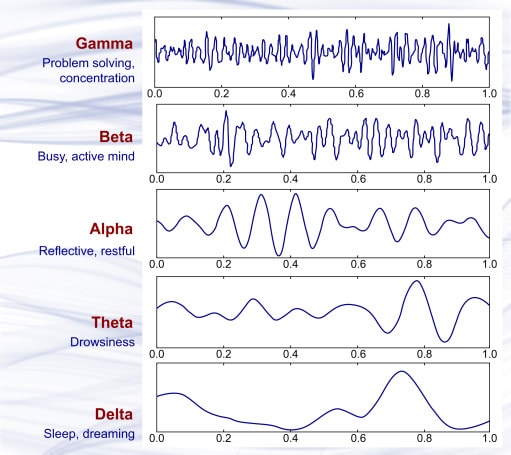
What is Neurofeedback Therapy?
Neurofeedback is a form of biofeedback that measures brain activity and provides feedback through auditory or visual stimuli. It can be used to help people learn how to control their own brainwave patterns, enabling them to reduce stress levels, improve focus and concentration, enhance cognitive performance, and more. Neurofeedback has been used in medical settings to help with conditions such as depression, anxiety, ADHD, PTSD, and addiction. Neurofeedback can also be used in various contexts, including personal development and peak performance training. Recently, it has become increasingly popular among athletes who use it to improve their mental game and achieve higher performance. Neurofeedback allows users to gain greater self-awareness and control over their minds, providing them with the tools they need to unlock their true potential.
Neurofeedback is a non-invasive technique that measures electrical activity in the brain and provides real-time feedback on how your brain functions. This information can help people regulate their brain states, allowing them to manage stress, improve focus and concentration, and even alter their emotional state. By providing a window into the inner workings of the brain, Neurofeedback can be used as an effective treatment for many mental health conditions Including:
- Depression
- Anxiety
- ADHD
- PTSD
- Substance Abuse
It has also been used to help people develop greater self-awareness and control over their thoughts, emotions, and behavior.
How Does Neurofeedback Therapy Work?
Neurofeedback therapy is a form of biofeedback that uses EEG (electroencephalography) technology or other brainwave monitoring forms to measure your brain’s electrical activity. This data is used to give feedback about how the brain is functioning. Clients make changes to improve performance and alleviate symptoms from conditions like anxiety and depression. As patients learn to control brain activity, neurofeedback therapy can help with various mental health issues, such as:
- Improve Sleep
- Reduce Panic Attacks
- Manage Stress
- Focus Attention
- Improve Memory

The goal is to give you the tools to better manage your brain activity to achieve optimal functioning.
Neurofeedback therapy sessions typically involve wearing a headset that measures brain activity and provides feedback on how the brain responds. Patients can learn to control brain activity through practice, allowing them to maintain more balanced emotions and better manage stress. Neurofeedback therapy can be used as an alternative or in conjunction with traditional therapies like cognitive behavioral therapy (CBT) and psychotherapy. Neurofeedback therapy is safe, non-invasive, and has been shown to have few side effects.
Neurofeedback therapy seeks to train individuals to consciously increase their brain activity in specific areas associated with positive feelings and behaviors. By using positive reinforcement techniques such as rewards, feedback, and visual representations of brain activity, patients can learn to recognize patterns that can help them overcome common mental health issues.
Neurofeedback therapy provides a unique and beneficial approach to addressing mental health issues and can help foster a healthier life. This type of therapy is becoming increasingly popular due to its ability to provide individuals with practical tools that they can use to better manage their own mental health.
How Does Neurofeedback Therapy Affect the Brain?
Neurons produce different kinds of brainwaves, classified by how fast or slow they move. Examples of brainwaves include Alpha (8–12 Hz), Beta (13–30 Hz), Gamma (31–50 Hz), and Delta (1–4 Hz). These waves are associated with different states of consciousness.
- Alpha is most common in wakeful relaxation.
- Beta is most common during active concentration and problem-solving.
- Gamma is associated with higher levels of cognitive processing.
- Delta is associated with deep sleep.

Neuroscientists measure brainwave activity. By understanding how different types of brainwaves are connected to states of consciousness, it may be possible to identify and address cognitive issues. This technique involves training the brain to produce specific frequencies of brainwaves to enhance focus, concentration, and other cognitive abilities.
Neurofeedback is an exciting tool that leverages scientific advances, allowing individuals to practice self-regulation and gain control over their own mental performance. Users can learn to better manage their attention, emotions, and behavior by recording electrical signals from the brain in real-time and providing feedback. This can dramatically affect performance in areas such as creativity, focus, self-awareness, and mindfulness.
By using Neurofeedback alongside other therapies or on its own, individuals can gain insights into how their brains work and use this knowledge to improve their overall mental well-being. It’s an essential part of recovery for those suffering from addictions or other mental health issues.
The potential for Neurofeedback is enormous, and it has already been used to significant effect in many different contexts. As technology develops further, it is likely to become a vital tool in helping people understand and manage their mental health, as well as providing invaluable insights into the workings of the human brain. Neurofeedback can transform our understanding of how our brains work and open up many possibilities for mental health treatment.
Can Neurofeedback Therapy Be Useful for Addiction Treatment?
Neurofeedback therapy can be effective in treating addiction. Neurofeedback is a biofeedback therapy that helps people become aware of their brain activity and learn to regulate it to improve physical and mental well-being. It has been used successfully to treat addiction by assisting individuals in learning how to:
- Control cravings
- Minimize or eliminate triggers
- Address dual diagnosis disorders
- Manage stress
- Retrain the brain to break patterns of addiction
By helping individuals gain insight into their brain activity, Neurofeedback can help them identify the root causes of their addiction (Dual Diagnosis) more clearly and understand how to better regulate their thoughts and actions that may lead to addictive behaviors. Neurofeedback has been shown to increase relaxation and improve overall emotional balance, which can be beneficial in decreasing the risk of relapse. Neurofeedback is a safe and non-invasive treatment tailored to each individual’s needs. Check with any addiction treatment program you consider to ensure Neurofeedback is part of their comprehensive addiction recovery program.
Neurofeedback allows individuals to learn new techniques and strategies for managing addictive behavior, as well as gain an understanding of the underlying causes of their addiction. For example, it can be used to improve self-awareness and reduce negative emotional triggers that may lead to substance use or relapse. Additionally, Neurofeedback can strengthen positive emotions, promoting self-care and healthy lifestyle habits that protect against relapse. Neurofeedback also provides a safe environment for individuals to practice new skills in managing emotions and stress without needing drugs or alcohol.
Neurofeedback is an effective tool for addiction recovery that helps individuals understand their brains, recognize patterns in their behavior, and develop healthier habits to prevent relapse. It can also be used to improve decision-making skills and reduce impulsivity, key components of successful addiction recovery. Furthermore, Neurofeedback has been proven to reduce cravings for drugs or alcohol and increase overall well-being, making it an invaluable tool in addiction recovery. By increasing self-awareness and providing individuals with the skills to manage stress, Neurofeedback can be a powerful ally in taking back control of one’s life from substance use disorder. At Olympic Behavioral Health, we use Neurofeedback to complement our relapse prevention program and help ensure clients maintain their sobriety.
By using Neurofeedback as a holistic approach to addiction treatment, individuals can develop healthier habits and behaviors that support long-term recovery. Neurofeedback can help individuals create healthy coping mechanisms, improve self-esteem, and become better problem solvers. This therapy also promotes mindfulness which helps to regulate emotion, assisting people in managing intense feelings more positively. Neurofeedback can help people break the cycle of substance use and create better physical, mental, and emotional health.
Neurofeedback is a holistic therapy to help individuals become more aware and in tune with their bodies and minds. It has been shown to reduce symptoms associated with mental health issues such as depression, anxiety, and PTSD and improve physical health. Neurofeedback can help people develop better communication and social skills.
Combining Neurofeedback with Other Therapies
Neurofeedback can be combined with other therapies. In fact, it is often used in combination with cognitive behavioral therapy or psychotherapy to address underlying psychological issues or behaviors associated with a condition. Additionally, combining Neurofeedback with physical therapies such as exercise and lifestyle changes may help improve overall brain health and functioning. Neurofeedback also enhances relaxation techniques to improve sleep and boost overall mental well-being. Ultimately, the best combination of therapies will depend on the individual’s condition and should be carefully considered by a qualified professional.
It is important to note that Neurofeedback should not be used as a standalone therapy for any condition but as a helper for other treatments. Neurofeedback can take time and consistency to see positive results. Staying with the plan for a while is necessary before expecting any improvement. This may include attending weekly or bi-weekly sessions for several months. With patience, however, you can achieve positive results from your neurofeedback treatments.
Remember that if you are ever feeling overwhelmed or unsure of the progress of your treatment, make sure to speak to your doctor and mental health professional about any concerns regarding the outcomes.
PHP Neurofeedback Therapy & IOP Neurofeedback Therapy
In the context of a Partial Hospitalization Program (PHP) or Intensive Outpatient Program (IOP), neurofeedback can help individuals better manage the stressors of everyday life and make positive behavior changes. Neurofeedback can:
- Strengthen cognitive skills
- Improve attention span
- Increase self-awareness
- Reduce symptoms insomnia
When used in conjunction with other treatment modalities, such as psychotherapy or medication management, neurofeedback can be an effective way to help individuals achieve a healthier and more balanced lifestyle. Neurofeedback is also often used for athletes looking to improve performance and children with ADHD and autism.
Neurofeedback practitioners use specialized equipment that records brainwave activity from the scalp and presents this information in real time on a monitor. The client can then observe their brain waves responding to different stimuli, such as sounds, visuals, or music. During this process, the brain is trained to either increase or reduce specific frequencies depending on the desired outcome. A practitioner may use neurofeedback to train the brain to produce more Beta waves, which are associated with alertness and focus. That way, a client can focus on and maintain attention.
This type of training can be highly effective when done correctly, as it allows the client to become more aware of how their brain works and how to manipulate it to obtain desirable outcomes. However, neurofeedback is not a one-size-fits-all solution.
How Long Do Neurofeedback Sessions Last?
The length of each neurofeedback session depends on the type of feedback used. Generally, sessions last between 30 minutes to an hour and a half. In some cases, therapy may require multiple shorter sessions over an extended time to be effective. Your doctor or therapist can advise you on what they believe will work best for your needs. Remember that neurofeedback is not a quick fix. It requires time and effort to see results.
It is also important to note that the benefits of neurofeedback may extend beyond the session, so additional positive effects may be experienced after each session has concluded. This could include improved sleep, increased concentration, decreased anxiety, or other positive outcomes. Discuss any changes you share with your doctor or therapist so they can help you understand and process the effects of neurofeedback.





